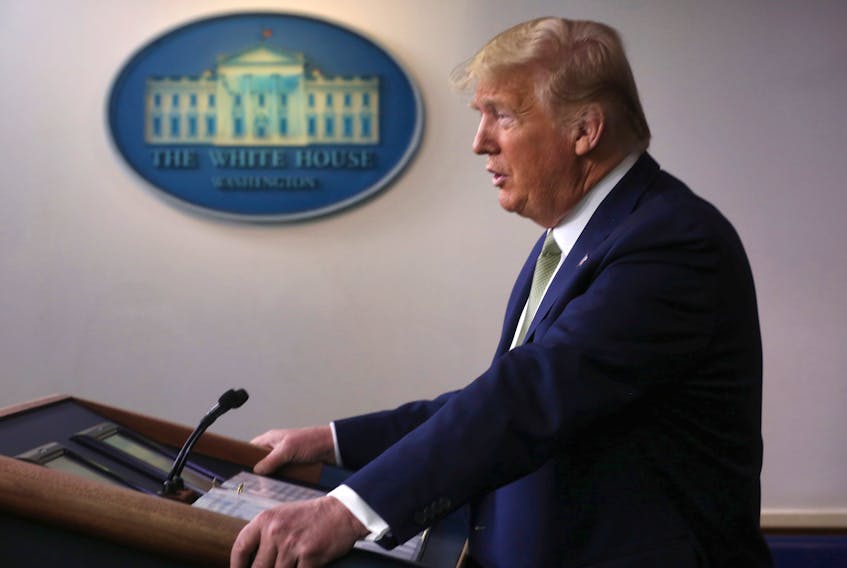When scholars eventually chronicle the legacy of the Donald Trump presidency, they will undoubtedly single out the 2020 pandemic as his most disastrous set of policy choices. Not only has Trump largely abdicated federal or national responsibility for fighting the lethal novel coronavirus pathogen, but his narrow economic and electoral rationale for doing so has had dire life-and-death consequences.
By effectively turning things over to state and local governments, Trump was hoping to distance himself from any political fallout from the anticipated increase in COVID-19 cases, hospitalizations and eventual deaths. To be sure, the whole idea of pushing so hard to open up the U.S. economy — even when the epidemiological data was saying otherwise — was the centrepiece of his re-election strategy. Simply put, a buoyant economy was his ticket to retaining the keys to the White House in November.
With little or no leadership at the top, especially on the critical issue of widespread testing and meticulous contact tracing, frantic state governors have been left to their own devices. This calamitous situation today in the United States — with runaway new coronavirus cases and the lag in spiking mortality rates — has been the deadly outcome of an ill-conceived White House pandemic strategy.
Given the wealth, expertise and advanced medical infrastructure in the U.S., why did this human catastrophe happen? How could advisers in the Trump administration get the response to the coronavirus so wrong? Does "Groupthink" theory offer any explanatory insights into this failed set of policy decisions?
A recent New York Times piece, Inside Trump’s Failure: The Rush to Abandon Leadership Role on the Virus, was particularly illuminating and useful from a group psychology perspective. In fact, the incredibly risky and dangerous Trump approach has all the hallmarks of what intellectual Irving Janis once coined as 'Groupthink.'
As the work of Janis highlights, there are clearly identified “symptoms” of groupthink — such as a very cohesive in-group of decision-makers, “concurrence-seeking” tendencies, a strong feeling of group solidarity and an absence of critical thinking.
Other symptoms include an over-confidence in the group’s intellectual prowess, a sense of invulnerability and an automatic assumption that what they were doing was correct. Add to that mix a disregard for the views of outside experts, a fierce sense of unanimity amongst the group and the group’s inevitable tunnel vision in assessing a problem.
There is also pressure applied to dissenters to fall into line with the prevailing group consensus. Furthermore, Janis talked about the presence of so-called “mindguards,” who essentially protect the president from meeting with “outsiders” with contrary points of view.
With respect to the current pandemic, we know that Trump’s chief of staff, Mark Meadows, has been meeting every morning at 8 a.m. since April with a small group of key officials to plot the course for the administration’s coronavirus response. The Times article describes them as a group of “practical problem solvers” working together on issues like personal protective equipment, diagnostic testing and mechanical ventilators.
By early spring, members of the cohesive group came to the consensus that the respiratory virus was disappearing, that state governments had all the medical resources that they needed and that it was time to gradually open things up. As far as they were concerned, it was the individual states that were best placed to contain whatever viral “embers” would pop up periodically.
One of the critical members of the president’s team was Dr. Deborah L. Birx, an experienced infectious disease specialist and the special representative for global health diplomacy for the U.S. State Department. Rather than offer alternative arguments about the inherent risks of their strategy, warnings about bias and uncritical thinking or even a possible contingency plan, she retained her influential position (and the ear of President Trump) within the group by not challenging the consensus view that the pandemic was waning (or would follow the Italian trajectory).
Conversely, it seems pretty obvious that Dr. Anthony S. Fauci, the renowned physician and immunologist at the National Institute of Allergy and Infectious Diseases — who has espoused a far different view of the coronavirus — has been mostly ostracized by the Meadows group. Indeed, his views don’t correspond with the consensus of the in-group and thus has found himself the target of a vicious smear campaign by White House insiders. People like Peter Navarro (top trade adviser) and Dan Scavino (deputy chief of staff for communications) would be the main instigators — or what Janis characterized as the president’s “mindguards.”
Of course, theoretical models like "groupthink" are not always a perfect explanatory fit and thus one should be mindful about trying to force square pegs into round holes. Poor decision-making, then, may not necessarily be the result of groupthink. But the key assumptions underscoring the model do offer us some important insights into the “why” of Trump’s tragic pandemic policy blunder.
Peter McKenna is professor of political science at the University of Prince Edward Island.









